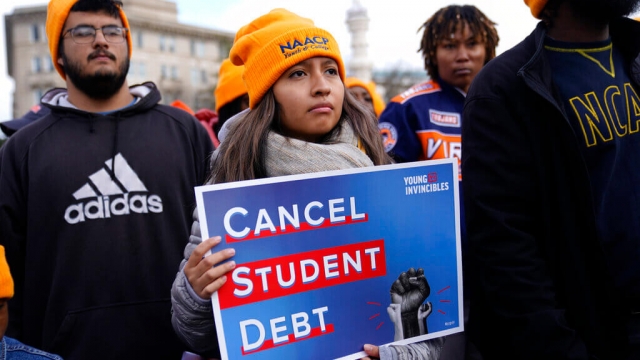Student loan repayments could start as soon as this summer if the Supreme Courtblocks the Biden administration’s student loan forgiveness plan.
Justices have 30 cases left on the docket before their term finishes, which is usually by the end of June.
They're expected to issue new decisions Thursday, June 1, which could potentially include rulings on two different cases that both argue the Biden administration did not have the authority to forgive millions of borrowers.
Mark Kantrowitz, a financial aid expert and author of "How to Appeal for More College Financial Aid," says, "It's going to be a 5-4 decision, but I can't tell you whether it's going to be 5-4 in favor or 5-4 against."
During oral arguments in February, the Biden administration argued they could relieve debt under the HEROES Act of 2003, a law ensuring borrowers don't suffer during national emergencies.
President Joe Biden wants to forgive as much as $20,000 of debt per borrower for more than 40 million Americans.
But Kantrowitz says the estimated $400 billion cost over three decades did not sit well with the court's conservative justices.
SEE MORE: Wealthier borrowers benefited most from student loan payment pause
"There's something called the major questions doctrine, which says that when it is a major question, such as something involving something of significant sums of money," said Kantrowitz. "Then Congress has to have explicitly authorized the program."
Kantrowitz said several justices, including Chief Justice John Roberts, were doubtful that President Biden could forgive loans because the HEROES Act didn’t explicitly authorize a forgiveness program.
Should the court rule against the administration, Kantrowitz predicts a rocky road ahead for debt relief.
"The plan Bs are a bit of a stretch and are not a practical solution," said Kantrowitz. "Their main opportunity would be to convince Congress to pass such legislation. And that doesn't seem likely either."
26 million Americans have already applied for debt relief, with 16 million being approved. But nobody will see a penny if the court blocks the relief plan.
If that happens, loan payments will restart 60 days after litigation ends.
Right now, Kantrowitz recommends borrowers update their contact information, set up automatic payments so they don't miss the potential re-start date, or call their loan officers to discuss deferment options.
Trending stories at Scrippsnews.com



